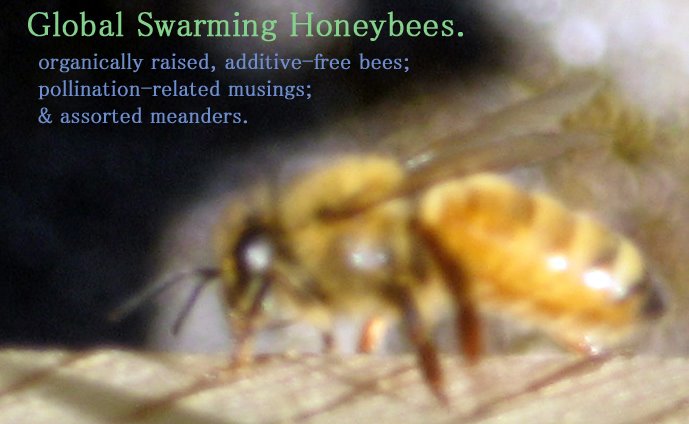It's National Pollinator Week, so please do what you can, this and every week, to support our insect allies, our songbirds, and the rest of the gang.
One thing we can all do is wake up and smell the coffee (which is, as it happens, pollinated by bees, along with ants and other devalued critters).
Coffee-whiff Part 1:
Press release 5/21/08 Coalition against BAYER Dangers (Germany); "The German Office for Consumer Protection and Food Safety (BVL) has ordered the immediate suspension of the approval for eight seed treatment products due to the mass death of bees in Germany's Baden-Wuerttemberg state. The suspended products are: Antarc (ingredient: imidacloprid; produced by Bayer), Chinook(imidacloprid; Bayer), Cruiser (thiamethoxam; Syngenta), Elado (clothianidin; Bayer), Faibel (imidacloprid; Bayer), Mesurol (methiocarb; Bayer) and Poncho (clothianidin; Bayer). According to the German Research Centre for Cultivated Plants 29 out of 30 dead bees it had examined had been killed by contact with clothianidin. Also wild bees and other insects are suffering from a significant loss of population."
(And that's probably putting it mildly.)
Coffee-whiff Part 2 (as reported by the folks at Bee Culture):
Sierra Club Wants Treatments Stopped, NOW!
From Alan Harman
The Sierra Club accuses the U.S. Department of Agriculture of caving in to lobbyists over massive bee deaths and compares this with Germany taking a major step to keep their bees pollinating crops.
In light of the mounting evidence that new seed chemical coatings are deadly to bees and action by Germany calling for their immediate suspension, the Sierra Club reaffirmed its call for a U.S. moratorium on specific chemical treatments to protect our bees and crops until more study can be done.
It cites Germany's federal agricultural research institute as saying, "It can unequivocally be concluded that poisoning of the bees is due to the rub-off of the pesticide ingredient clothianidin from corn seeds."
At issue are the neonicotinoids, including clothianidin, being used in a new way - as seed coatings.
For years, farmers have been spraying neonicotinoids onto their crops to stop insect infestation. Now Bayer, Syngenta and Monsanto have acquired patents to coat their proprietary corn seeds with these neonicotinoids.
"Part of the equation in the U.S. is genetically engineered corn, as more and more corn seeds are being gene spliced with a completely different species -- a bacterium," says Walter Haefeker of the German Beekeepers Association Board of Directors. "Bayer and Monsanto recently entered into agreements to manufacture neonicotinic-coated genetically engineered corn. It's likely that this will worsen the bee die-off problem."
A Sierra Club statement says American Beekeeping Federation former president David Hackenburg has been urging the U.S. Department of Agriculture to do more study.
"Look at what's time based,” it quotes Hackenburg as saying. “The massive bee decimation started when regulatory agencies rubber stamped the use of neonicotinoid spraying and coating."
Sierra Club genetic engineering committee chairman Laurel Hopwood says the club joins the concern of beekeepers.
"It's unfortunate that regulatory agencies are using double speak,” he says. “They claim to protect our food supply - yet they aren't doing the proper studies. The loss of honeybees will leave a huge void in the kitchens of the American people and an estimated loss of $14 billion dollars to farmers. We call for a precautionary moratorium on these powerful crop treatments to protect our bees and our food."
Like I said, Happy Pollinator Week.






2 comments:
Great article, thanks.
I personally think more attention should be given to the fact that the foolish weed and lawn care laws in the world are also directly responsible for damaging, destroying and obliterating the habitat for the pollinators that our food system and the web of life on earth depend on, as well as causing much of the pollution from run off that is causing the dead zones in our oceans.
Agreed!
Post a Comment